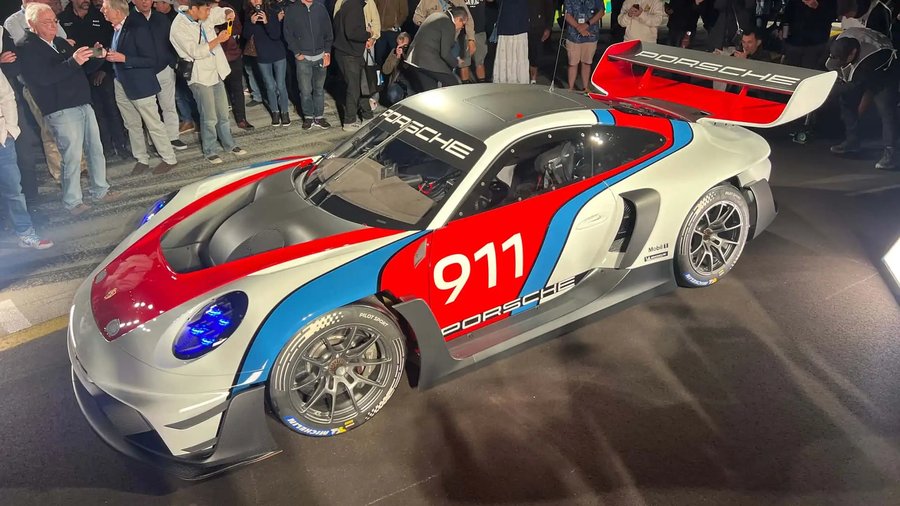Limited-run Porsche 911 GT3 is firm’s hottest track car yet

The Porsche 911 GT3 R Rennsport has been revealed as an £822,000 limited-edition successor to the iconic Porsche 935 racer and is the firm's most potent track-only car yet.
Said by Porsche to "cast aside all constraints of the FIA GT3 regulations", the 911 GT3 R-based sports car is destined for a 77-unit production run after its planned presentation on 28 October at Rennsport Reunion - one of the world's largest gatherings of Porsche enthusiasts.
Two versions of the 1240kg racer are available with different specifications based on racetrack noise regulations - an unsilenced variant and a silenced version, the latter available in two guises and with catalytic converters.
Power comes from the same 4.2-litre six-cylinder boxer engine as that used by the 911 GT3 R, but a host of efficiency tweaks boost its power from 557bhp to 611bhp, its redline to 9400rpm, and its top speed from 184mph to 196mph.
An output of 148bhp per litre is "a record for a naturally aspirated engine of a GT racing car", Porsche says. Power is sent to the rear wheels via a six-speed sequential gearbox.
The engine itself has been designed to run on bi-ethanol fuels and e-fuels to make it as carbon neutral as possible in operation. However, it can also run on conventional unleaded.
Thomas Luadenbach, vice president of Porsche motorsport, said: "The new Porsche 911 GT3 R Rennsport offers the experience of driving a 911-based racing car in what is probably the most primal form. It gives you goosebumps whenever you look at it and combines the finest motorsport technology with a design language that is typical of Porsche."
Designed by Grant Larson and Thorsten Klein of Porsche Style, the Rennsport is said to share only its bonnet and roof with the donor car.
The rest of the bodywork is entirely bespoke, with a stretched wheelbase and widened wheel arches, both of which sit on lowered springs and new 18i BBS alloy wheels.
The body itself is all carbonfibre and punctuated by aero-optimised fins and larger air intakes on the front wheel arches, as befits its track remit. The exterior mirrors have also been ditched for electronic screens fed by a trio of cameras mounted on the body.
Towards the rear, it shares design elements with past Porsche racers. For example, the bumper-width rear wing takes influence from the seven-time Daytona-winning Brumos Porsche 935/77, and its vertical spoiler supports are said to be reminiscent of the Porsche 962 Le Mans racer. To reduce weight, it does without grille covers and certain panels, leaving components such as the exhaust open to the elements.
More weight-saving measures have been made inside, with the removal of the front and rear passenger seats and air conditioning system.
It also gets a plaque denoting which model number the customer has chosen, two monitors to replace the door mirrors, colour-adjustable ambient lighting and an FIA-spec roll cage.
It will be launched with a choice of seven colours, including Star Ruby, Signal Orange, and Agate Grey Metallic (brand new for the 911 range).
Along with those seven colours, there are three liveries: Rennsport Reunion Design, said to be inspired by Laguna Seca's iconic Corkscrew corner; Flacht Design, named after the town in which Porsche Motorsport is based; and Speed Icon Design, which has shades of blue said to emphasise the car's width.
Underneath, its chassis is identical to that of the GT3 R, with double wishbones at the front, a multi-link set-up at the rear and five-way adjustable shock absorbers.
Other bespoke components include the tyres, developed by Michelin to improve warm-up time and drivability compared with other motorsport tyres.
Verwandte Nachrichten
